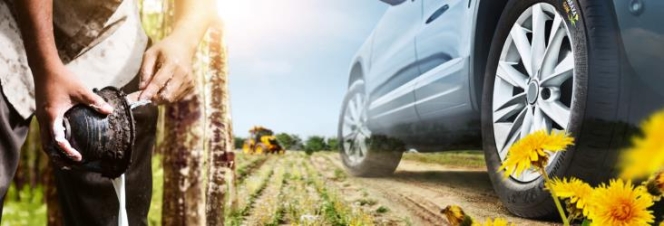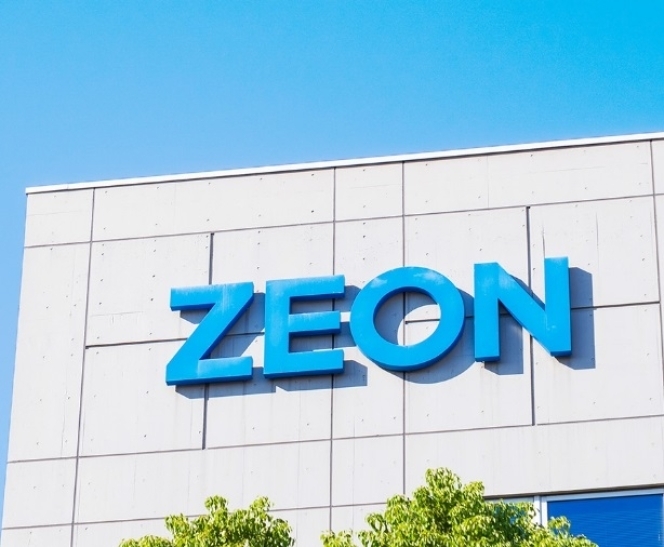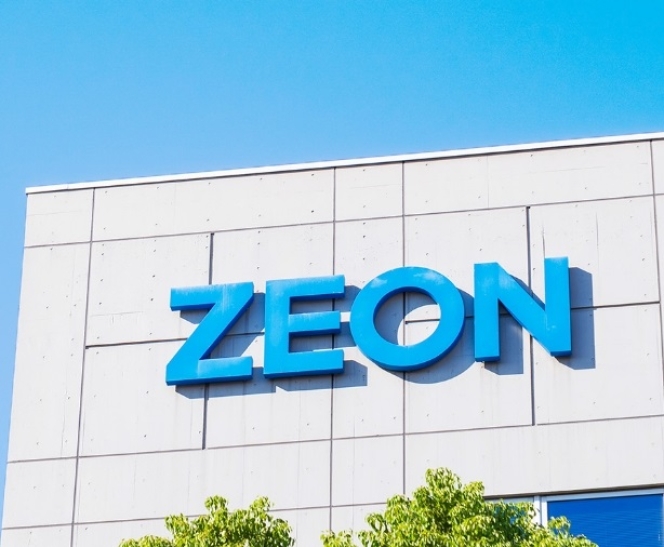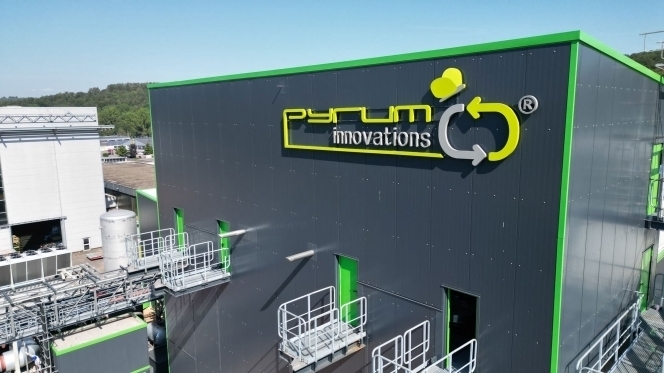Recycled Rubber, Rice Husks and Plastic Bottles: Sustainable Materials In Tyre Production
- By TT News
- February 14, 2023

Continental is making huge strides in using sustainable and recyclable raw materials.
Car tyres are round, black and made of rubber. Look closer, however, and you’ll see that the design of tyres and the interaction of the various materials that go into making them are extremely complex. But for some time now, material experts and tyre engineers at Continental have been bringing about a silent revolution. By 2050 at the latest, all tyres are to be made of sustainable materials. There is still a long way to go until then. But step by step, it is already becoming apparent which raw materials will find their way into tyre construction in the future. These include waste products from agriculture (such as the ash from rice husks), rubber from dandelions, recycled rubber or PET bottles.
Claus Petschick, Head of Sustainability at Continental Tires, is clear about Continental’s mission, saying, “Continental is on the road toward becoming the most progressive manufacturer in the tyre industry in terms of sustainability. We aim to use 100 percent sustainable materials in our tyre products by 2050 at the latest. Our innovative power enables us to break new and even more sustainable ground. This encompasses everything from the origin and sourcing of our materials through to the reuse and recycling of our tyres.”
Already today, around 15-20 percent renewable or recycled materials are used in a standard passenger car tyre from Continental. To further increase the proportion of sustainable materials and conserve valuable resources, Continental continuously analyses and reviews all raw materials used in tyre production.
Perfect material matching for maximum safety
Depending on the application, season and environment, tyres have to fulfill specific requirements. This can be seen in, for example, the tread design. But in other areas – the composition of the rubber compound, for example – these changes are not so readily visible. Passenger car tyres from Continental consist of as many as a hundred different raw materials.
Their precise composition has a major impact on the tyres and their handling characteristics. The ability to deploy the various materials with their unique properties and interdependencies in specific ways is a complex balancing act for Continental’s engineers and material experts. Only when all the materials are ideally matched to each other can safe, energy-efficient and durable high-performance tyres be created.
Natural rubber still essential due to exceptional properties
Natural rubber is essential for ensuring outstanding tyre performance. This natural product accounts for between 10 and 40 percent of the entire weight of modern high-performance tyres. Its special properties include the high level of strength and durability, which are caused by the strain-induced crystallisation of the rubber. The tyre industry is the biggest consumer of global rubber production, accounting for more than 70 percent. However, Continental considers natural rubber a sustainable material only if it is sourced responsibly. Therefore, the company employs an integrated approach aimed at making the complex and fragmented supply chains for natural rubber more sustainable, including using cutting-edge digital technology, local involvement and close collaboration with capable partners with the goal of improving transparency and traceability along the entire value chain. Meanwhile, with its Taraxagum project, Continental is pursuing an innovative approach to ensure that it can become less dependent on natural rubber grown primarily in southeast Asia. The tyre manufacturer is working alongside partners on industrialising the extraction of natural rubber from specially cultivated dandelion plants.
Sustainable plant-based fillers
In addition to rubber, fillers such as silica are essential to tyre assembly. Silica, for example, helps to optimise characteristics such as grip, rolling resistance and tyre life. In the future, rice husks will be used as the source material for sustainably-produced silica. Rice husks are a waste product of rice production and cannot be used as food or animal feed. Silica derived from the ash of rice husks is more energy-efficient when used in manufacturing than that obtained from conventional materials such as quartz sand.
Plant-based oils, such as rapeseed oil and resins based on residual materials from the paper and wood industries, already offer an alternative to crude-oil-based fillers in Continental's tyres. Only oils that meet technical quality standards and are not suitable for consumption are used. Oils and resins allow for flexibility in terms of tyre compounds and so improve the material’s grip.
Expanding the circular economy
Continental is aiming for fully circular operations in its tyre production by 2050 at the latest. In addition to the use of renewable materials, the company is working systematically on using recycled raw materials in tyre production. This is intended to ensure that carbon black – another crucial filler in rubber compounds – can be obtained on a large scale in the future. Continental recently signed a development agreement with Pyrum Innovations with a view to further optimising the recycling of materials from old tyres. To do this, Pyrum breaks the old tyres down into their constituent parts in an industrial furnace using a special pyrolysis process. This way, valuable raw materials contained in end-of-life tyres can be extracted and recycled. Both companies are working towards obtaining high-quality raw materials from the pyrolysis oil obtained for Continental's tyre production in the medium-term, in addition to the direct use of high-quality carbon black. In the long-term, the tyre manufacturer and Pyrum are aiming to establish a closed loop circular economy concept for the recycling of old tyres.
Recycled rubber from end-of-life tyres
In addition to pyrolysis, Continental is also making use of mechanical processing of end-of-life tyres. Rubber, steel and textile cord in particular are separated from one another in a highly sophisticated process. The rubber is then prepared for re-use as part of new rubber compounds.
Continental has a long history of working consistently to introduce end-of-life tyres into the circular economy to conserve resources and the environment. A material known as Conti-Reclaim has been obtained as part of the truck tyre retreading process at the company’s plant in Stöcken in Hanover since 2013. It has been used in tyre production at Continental for years. To expand the range of applications for the recycled rubber and optimise the properties for the various fields of application, Continental uses not only Conti-Reclaim but also recycled rubber from other suppliers.
Recycled plastic bottles in tyre casing
“Recycled raw materials are going to play a big role in making tyres more sustainable. We use recycled materials whenever possible. Comparable quality and material properties to conventional raw materials are crucial for us,” says Petschick.
For example, Continental is working with partners to obtain high-quality polyester yarn for its tyres from recycled PET bottles. PET bottles often end up in incinerators or landfills otherwise. With its ContiRe.Tex technology, the tyre manufacturer has developed a more energy-efficient and eco-friendly alternative that allows it to reuse between nine and fifteen plastic bottles for each tyre, depending on the tyre size. The recycled PET has already replaced conventional polyester in the structures of some tyre casing. The PET bottles used are sourced exclusively from regions where there is no closed recycling loop.
Systematically moving toward greater sustainability
Continental is working to advance innovative technologies and sustainable products and services throughout its entire value chain, from sourcing sustainable materials to recycling end-of-life tyres. The company is aiming to achieve 100 percent carbon neutrality by 2050 at the latest.
Zeon And Visolis Sign Binding Term Sheet To Advance Bio-Isoprene And SAF Commercialisation
- By TT News
- February 16, 2026

Zeon Corporation and Visolis Inc. have formalised their partnership by signing a binding term sheet, marking a pivotal advancement in the commercialisation of bio-based isoprene monomer and sustainable aviation fuel (SAF).
This collaboration, which now moves from technology verification towards project implementation, is built upon the progress made since their initial memorandum of understanding in March 2024 and the subsequent joint feasibility study announced in April 2025. Bio-based isoprene monomer serves as an essential component in the production of synthetic rubbers and various other materials, while SAF is increasingly recognised as a critical next-generation fuel for reducing carbon emissions within the aviation industry.
The newly established term sheet outlines a foundational agreement on the key elements required for a final investment decision. These include defining the business structure and the respective roles of each company, establishing technology and development strategies and advancing detailed engineering for the proposed production facility. Furthermore, the agreement covers the evaluation of potential sites, the process for engaging with suppliers, securing necessary regulatory approvals and planning the financing pathway.
The envisioned facility is set to commence commercial-scale output after successfully demonstrating mass production capabilities for biomass-based isoprene and SAF, utilising Visolis’ proprietary technology. Both companies are now committed to expediting the path to full-scale production and ensuring a steady supply of these sustainable products to the global market.
Zeon Backs Chemify To Accelerate Digital Chemistry Innovation
- By TT News
- February 12, 2026

Zeon Corporation has deepened its commitment to digital chemistry through a strategic investment and partnership with Chemify Limited, secured via its corporate venture arm Zeon Ventures Inc. Chemify, a growth-stage UK enterprise, is reshaping molecular research by integrating digital tools with automated laboratory systems. Its proprietary Chemputation technology translates molecular targets into executable chemical code, which operates directly on robotic platforms to complete integrated Design–Make–Test–Analyze cycles without manual intervention. This closed-loop automation allows Chemify to explore previously inaccessible areas of chemical space while reducing the timeline from concept to synthesized compound by up to tenfold.
A cornerstone of Chemify’s capability is its recently inaugurated Chemifarm in Glasgow – one of the most sophisticated automated facilities in the world for molecular design and construction. The facility enables accelerated iteration and autonomous synthesis of novel small molecules, converting chemical code into tangible compounds with unprecedented efficiency. These advances are critical for developing functional, synthesisable molecules that can contribute solutions to urgent global issues spanning public health, energy efficiency and environmental protection.
Zeon has been at the forefront of adopting digital methodologies in chemical R&D, recognising their transformative potential from an early stage. This investment is positioned to strengthen Zeon’s internal digital chemistry efforts and catalyse the invention of novel materials capable of addressing complex societal needs. The move aligns with Zeon’s STAGE30 corporate strategy, which targets a rise in revenue contribution from four key growth sectors – Mobility, Healthcare and Life Sciences, Telecommunications and Green Transformation – to 48 percent by fiscal 2028. By backing pioneering enterprises and cultivating advanced materials, Zeon continues to advance its dual vision of a sustainable planet and a secure, progressive society.
- Rubber Board Of India
- Rubber Producers’ Societies
- Sulphur Dusting
- Powdery Mildew
- Rubber Plantations
- Rubber Board Subsidy
Rubber Board Announces Sulphur Dusting Subsidy For Rubber Producers
- By TT News
- February 09, 2026

The Rubber Board of India has announced the opening of an application window for financial aid for sulphur dusting to combat powdery mildew disease in rubber plantations for the year 2026. The scheme is open to all Rubber Producers’ Societies (RPS) operating in both traditional and non-traditional growing regions.
From 10 to 20 February 2026, eligible societies must submit their applications online through the 'ServicePlus' portal on the official Rubber Board website. Societies requiring help with the submission process are advised to contact their nearest Rubber Board regional office or field station, or to consult the board's website for further guidance.
French Recognition Of TPO Bolsters Pyrum's Circular Economy Model
- By TT News
- February 09, 2026

Pyrum Innovations AG has welcomed the official recognition by French authorities on 17 January 2026, which classifies tyre pyrolysis oil (TPO) as a legitimate raw material for the chemical sector. This pivotal regulatory milestone for pyrolysis oil derived from end-of-life tyres substantially enhances the product’s integration into established chemical value chains. It also provides greater predictability for future purchase and partnership frameworks, thereby accelerating the development of industrial material cycles.
For Pyrum, which processes scrap tyres through pyrolysis to recover pyrolysis oil, industrial carbon black and steel, this decision underscores the critical need for standardised and reliable regulatory conditions. Such clarity is fundamental for scaling investments, production volumes and supply chains, particularly as the chemical industry and circular economy converge. The establishment of clear product categories is essential to ramp up the market for high-quality recycled raw materials.
The company remains committed to tracking further developments in France and the wider European dialogue regarding the classification and application of recycled feedstocks. Pyrum’s overarching objective is to expand industrial-scale recycling solutions for scrap tyres. This regulatory progress directly supports the company’s mission to secure long-term, quality-assured supply agreements with partners across the chemical industry, thereby advancing a more sustainable and circular economic model.
Pascal Klein, CEO, Pyrum Innovations AG, said, “The decision in France is an important step for the industrial use of pyrolysis oil from waste tyres. It supports a trend that we are seeing in many markets, where the chemical industry is seeking reliable, technologically robust and clearly classified alternative raw materials.”







Comments (0)
ADD COMMENT